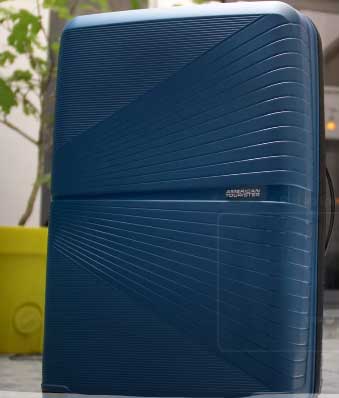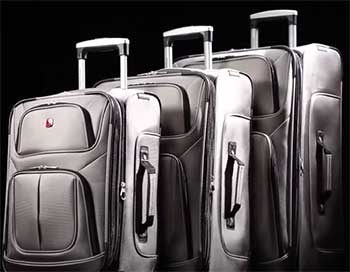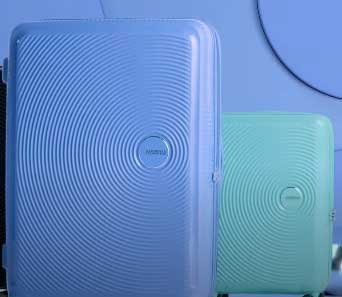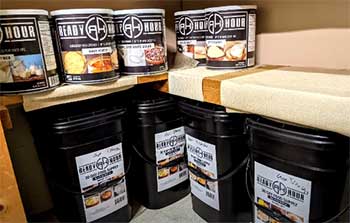When it comes to buying new luggage, two of the top brands to consider are American Tourister and SWISSGEAR. Both companies make durable and stylish suitcases and travel bags.
But which brand truly comes out on top?
In this comprehensive comparison guide, we’ll evaluate the key factors that matter most when shopping for luggage. We’ll examine the features, quality, prices, and real customer experiences with both American Tourister and SWISSGEAR luggage.
By the end, you’ll have all the information you need to decide if American Tourister or SWISSGEAR is the best luggage brand for your next trip.
A Brief Comparison Table
| Aspects | American Tourister | SWISSGEAR |
| Materials | 600D/1680D polyester fabric for softside bags; ABS plastic for hardside | 1200D ballistic polyester fabric |
| Durability | Prone to cracks, breakage, and wear, especially with frequent use | Withstands years of frequent travel |
| Design | Basic internal organization; wide style/color options | Lots of compartments and tech features; limited color options |
| Weight | Heavier models; spinners are lightweight | Lightweight softshell design |
| Price | $50 – $100+ | $60 – $300+ |
| Warranty | 1-5 years coverage | 5-10 years coverage |
| Best For | Occasional vacations and short trips | Frequent travel and long adventures |
Also Read: Differences Between Bugatti And Samsonite Luggage.
Overview of American Tourister and SWISSGEAR
First, let’s start with a quick rundown on both brands.
- American Tourister has been around for over 75 years. It’s known for making affordable and lightweight luggage from hardside and softside materials. The company sells suitcases, duffel bags, backpacks, and accessories. American Tourister is actually owned by the larger Samsonite brand.
- SWISSGEAR entered the luggage scene more recently in 1998. It’s best known for its use of durable fabrics like ballistic weave nylon in its softside luggage. SWISSGEAR’s suitcases and backpacks emphasize function with lots of pockets and compartments. The brand sells more tech-focused luggage than American Tourister.
Key Differences Between American Tourister And SWISSGEAR Luggage
Now let’s take a deeper look at how the two brands compare across the factors that matter most in your luggage search.
- Materials and Durability

The materials used in a suitcase or bag play a huge role in its durability and longevity. This is an area where SWISSGEAR excels.
SWISSGEAR constructs most of its softside luggage from a proprietary 1200D ballistic polyester fabric. It’s thick and abrasion-resistant to prevent ripping or scuffing.
The brand uses durable zippers and reinforced seams for added structure too.
According to SWISSGEAR, this ballistic material is up to 39% thicker than standard polyester used by other brands.
Many customers praise how their SWISSGEAR luggage holds up through years of airline trips and rough baggage handlers.
American Tourister opts for more affordable materials in many of its softside suitcases and duffel bags.
You’ll typically find 600D and 1680D polyester instead of ballistic nylon. The zippers and seams may not be quite as heavy-duty either.
For its hardside suitcases, American Tourister uses a durable ABS plastic shell. But some reviewers complain about cracks forming or pieces breaking off after continuous use.
The consensus is that SWISSGEAR offers greater durability, especially for frequent travelers who really put their luggage to the test. American Tourister can work well for occasional vacations but may not withstand years of regular trips.
Also Read: How Showkoo And Coolife Luggage Stack Up?
- Design and Functionality
Luggage design encompasses factors like the overall shape, internal organization, and extra features. These elements all contribute to the functionality of suitcases and bags.
SWISSGEAR is well known for its innovative luggage designs geared towards tech-savvy travelers. For example, many of its suitcases have USB ports to conveniently charge devices on the move. There are also eTracks telescoping handles and Add-a-Bag straps for stacking luggage.

The company’s bags provide enhanced organization through multiple compartments, wet/dry pockets, and accessory storage.
Some SWISSGEAR backpacks can even hold laptops up to 17 inches.
American Tourister doesn’t offer quite as many tech extras and organizational features.
However, the brand still hits all the basics.
Its suitcases have interior tie-down straps, mesh pockets, and compression panels.
The carry-on bags work well for short trips where packing light is key.
One advantage of American Tourister is the ample color and style choices for hardside luggage. There are everything from solid colors to unique prints. SWISSGEAR focuses more on function over style.
Overall, SWISSGEAR comes out ahead for travelers who value design elements like USB ports, specialty pockets, and laptop sleeves. American Tourister offers just the essentials at a lower price point.
- Weight and Mobility
When lugging bags through airports and on trips, weight and mobility are important. You don’t want a heavy suitcase that’s difficult to transport.
SWISSGEAR Softshell luggage lives up to its name and has a lighter weight feel compared to brands like Samsonite. The ballistic polyester fabric keeps things durable yet reduces heft. Expandable backpack straps and smooth rolling wheels also improve mobility.
With American Tourister’s use of ABS plastic for hardside and cheaper polyester for softside bags, there’s often more weight. Spinner wheels and grab handles make the luggage manageable for shorter distances. But the greater weight is noticeable compared to SWISSGEAR for long treks through airports or trips.
For frequent jetsetters, SWISSGEAR’s lighter-weight construction helps avoid sore arms and shoulders. American Tourister works fine for lighter packers going on shorter excursions.
- Price and Value
As you’d expect, SWISSGEAR’s durable construction and extra features come at a price. Its suitcases and backpacks cost anywhere from $60 up to $300+.
American Tourister delivers good value at lower price points. You can find softside bags starting around $50 and hardside luggage under $100. Sales run frequently too.
So if your budget for new luggage is limited, American Tourister gets you reliable bags for vacation at a wallet-friendly cost. SWISSGEAR offers greater long-term value but requires more upfront investment.
- Style Options

One area where American Tourister pulls ahead of SWISSGEAR is style options.
As mentioned earlier, American Tourister’s hardside spinner luggage is available in dozens of colors and unique prints.
Examples include floral patterns, solid bold colors, camouflage, and more.
SWISSGEAR emphasizes function over form.
Most of its suitcases and backpacks come in neutral shades of black, gray, and blue.
There are occasional pops of color like red or teal but nothing too eye-catching.
So for travelers who want their luggage to be a stylish accessory, American Tourister offers more self-expression. SWISSGEAR buyers prioritize utility.
Also Read: How Rockland And Samsonite Luggage Stack Up?
Customer Satisfaction and Reviews
Looking at what real customers say about each brand is helpful too. Here’s a summary of common American Tourister and SWISSGEAR reviews:
American Tourister
- Affordable prices praised by many buyers on a budget
- Lightweight spinner bags are easy to move through airports
- Some quality concerns noted – broken handles, faulty zippers, cracked shells after limited use
- The unique style prints appeal to some customers over basic colors
SWISSGEAR
- Durable construction holds up well even after years of frequent trips
- TSA-approved locks, USB ports, and other features liked by tech-focused travelers
- Heavier backpack models can strain shoulders during long-term wear
- Impressive warranties on defects – 10 years for softside, 5 years for hardside
Overall, SWISSGEAR reviewers highlight the impressive durability and performance. American Tourister feedback is mixed – some love the low prices while others report quality concerns. Lower satisfaction with American Tourister seems directly tied to how much use the bags get.
Frequently Asked Questions About American Tourister And SWISSGEAR
Yes, SWISSGEAR is considered one of the best luggage brands overall thanks to its durable construction and innovative designs. Many frequent travelers praise SWISSGEAR for its use of rugged ballistic polyester fabric that withstands years of airline trips. Tech features like USB ports, laptop sleeves, specialty pockets, and Add-a-Bag straps also make SWISSGEAR bags very functional. For heavy-duty luggage built to last, SWISSGEAR is a top choice.
American Tourister can be a good option for more casual travelers and short vacations. Its hardside and softside bags are affordably priced under $100. The spinner suitcases are lightweight and easy to maneuver. However, American Tourister bags may not hold up well to heavy frequent use due to cheaper fabrics and components. Frequent flyers are better off spending more for the durability of SWISSGEAR. But American Tourister works fine for occasional trips.
When it comes to durability, SWISSGEAR and Samsonite are two of the top luggage brands recommended for frequent travelers. SWISSGEAR makes use of thick, abrasion-resistant ballistic nylon fabric that withstands years of airport trips and rough baggage handling. Samsonite uses strong polycarbonate shells and abrasion-resistant nylon fabric. Both brands use durable zippers, handles, straps, and wheels tested to high mileage. Briggs & Riley is another option praised for durability and great warranties against defects.
American Tourister and Samsonite are actually the same company. Samsonite acquired the American Tourister brand in 1993, but American Tourister still operates somewhat independently. The brands differentiate by target audience and price positioning. Samsonite offers higher-end luggage while American Tourister competes largely on affordability for more budget-conscious shoppers. But both Samsonite and American Tourister belong to the larger Samsonite company.
Also Read: How CALPAK And Travelers Choice Luggage Stack Up?
Final Verdict
So when comparing American Tourister and SWISSGEAR, which luggage brand comes out on top in this head-to-head matchup?
For frequent travelers who check bags often or take long adventures, SWISSGEAR is the clear winner. The durable construction, tech features, and smarter designs make SWISSGEAR luggage ideal for heavy use over many years.
American Tourister works best for casual travelers on shorter 1-2 week vacations. The affordability appeals to shoppers on a tight budget. But durability issues arise when bags get subjected to years of airline trips and adventure travel.
Here are some quick pros and cons summarizing the brands:
SWISSGEAR Pros
- Durable ballistic polyester fabric withstands heavy use
- Lighter weight than comparable brands
- Tech features like USB ports and laptop sleeves
- Enhanced organization with wet/dry pockets
- Impressive 10-year warranties with defects
SWISSGEAR Cons
- Higher price points than American Tourister
- Limited style options beyond black and gray
- Heavier backpack models can cause shoulder strain
American Tourister Pros
- Budget-friendly prices under $100
- Wide selection of stylish prints and colors
- Good choice for occasional vacations and short trips
- Lightweight spinner models move easily in airports
American Tourister Cons
- Durability issues more likely with frequent use
- Limited organizational features and tech perks
- Cheaper zippers and handles prone to breakage
For most travelers, SWISSGEAR bags are worth the investment if you can afford it. But American Tourister works fine for shorter, lighter vacation travel too.
Hopefully this detailed comparison has helped capture the key differences between the two brands. Let us know if you have any other questions as you shop for your perfect luggage. Safe travels!

